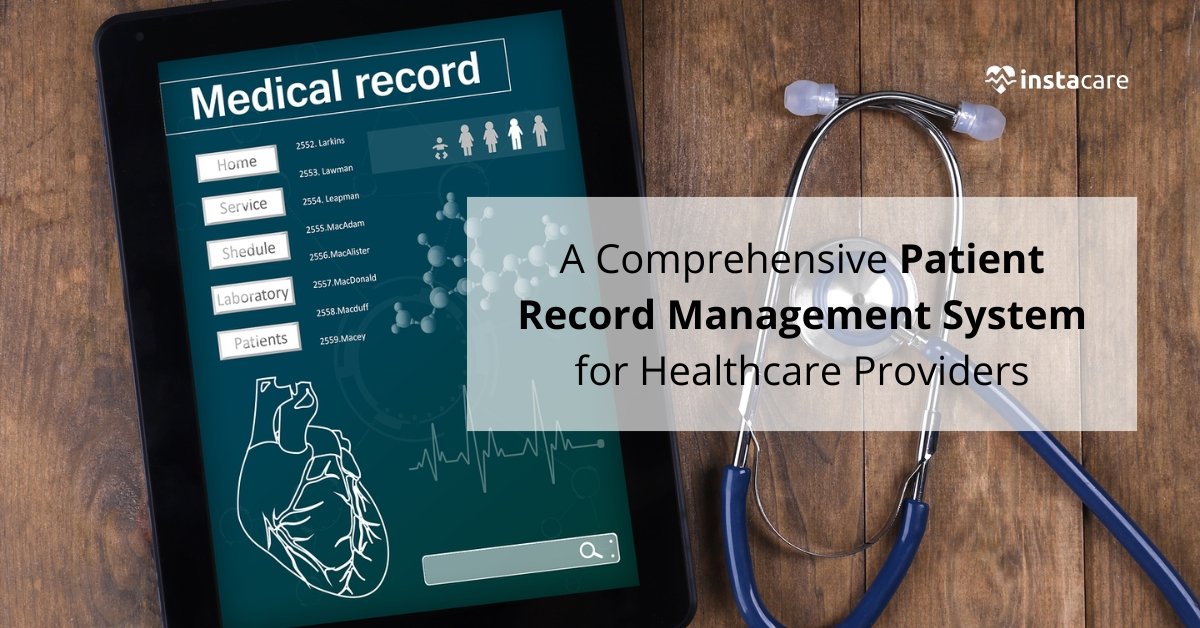Last updated on Tuesday, 8, April, 2025
Table of Contents
A Comprehensive Patient Record Management System for Healthcare Providers
Are you a healthcare provider looking for the most effective and efficient way to manage patient records? The emergence of modern technology and digitalization has made it possible to streamline patient record management systems. This blog post will discuss the benefits of a comprehensive data system for healthcare providers, including improved access to records, enhanced accuracy in medical diagnosis, increased accountability among staff members, and reduced paperwork. Whether you’re a single doctor or clinic needing quick on-the-go access or an entire hospital seeking secure yet timesaving storage solutions, this post will help you make an informed decision as you look at investing in a data management system. So come along and join us as we explore the opportunities that such a system can offer!
What is a Patient Record Management System?
A Patient Record Management System is a digital tool that healthcare professionals utilize to store, organize, and retrieve medical data about their patients. Patient record management systems provide a comprehensive and secure platform for healthcare providers to keep all patient data organized in one place. The systems generally have a user-friendly interface and are designed to improve patient care by providing quick and easy access to vital patient information, including medical histories, diagnostic test results, and treatment plans. These systems operate as a central database, allowing authorized healthcare workers to retrieve and update patient records whenever necessary from any location. The benefits of record management systems for healthcare organizations are immense, and they have become a necessity to maintain effective patient record keeping.
The benefits of an organized, consolidated patient record system
In today’s fast-paced world, healthcare organizations are constantly on the lookout for ways to streamline their operations. One effective solution is to implement a patient record management system. Consolidating all patient information into a single system can have numerous benefits. It saves time, reduces errors, improves communication between healthcare providers, and enhances patient safety. With a comprehensive record management system, clinicians have access to a patient’s complete medical history, which enables more accurate diagnoses and treatment plans. Additionally, it can reduce paperwork and save on storage space. Overall, an organized, consolidated patient record system is one of the best investments a healthcare organization can make, as it improves patient care while streamlining administrative tasks.
Examples of features commonly found in patient record management systems
Patient record management systems are an essential tool for healthcare professionals to manage, organize, and store patient information. These systems typically include a variety of features that assist with tasks such as patient registration, charting, and appointment scheduling. Additionally, many record management systems also offer features for billing and claims processing, as well as the ability to securely transfer patient information between healthcare providers. With the increasing importance of data security and electronic health records, the use of record management systems has become increasingly prevalent in modern healthcare settings. Overall, the incorporation of record management systems in patient care has greatly improved the efficiency and accuracy of medical practices, leading to better patient outcomes.
Tips to ensure your patient record system is secure and compliant with industry regulations
Ensuring the security and compliance of patient record management systems is of utmost importance to healthcare providers. With ever-increasing amounts of sensitive patient information being stored and accessed electronically, it is critical to have robust security measures in place to protect against data breaches and cyber attacks. Compliance with industry regulations, such as HIPAA, is also necessary to avoid costly fines and legal issues. To ensure the safety and regulatory compliance of your record management system, consider implementing measures such as strong passwords, access controls, and regular audits and updates. It is essential to prioritize the security of patient data to maintain the trust and confidence of both patients and regulatory agencies.
How to implement a patient record management system in your practice
As the healthcare industry continues to digitize, implementing a patient record management system in your practice has become increasingly important. This type of system can help streamline administrative tasks, improve patient care, reduce errors, and enhance overall efficiency in your practice. However, choosing and implementing a patient record management system can be a daunting task. It’s important to conduct thorough research and select a system that meets the unique needs of your practice. With the right record management system in place, you can efficiently manage patient records, improve communication with patients and colleagues, and ultimately provide better care to your patients.
What to look for when selecting the best system for your needs
When selecting the best system for your needs, it’s important to consider several key factors. For those in the healthcare field, patient record management systems are essential tools for maintaining accurate and up-to-date medical information. These systems can streamline workflows, reduce errors, and improve communication between healthcare providers, all of which can lead to better patient outcomes. When evaluating record management systems, it’s important to consider factors such as ease of use, data security, customization options, and integration with other software platforms. By taking the time to carefully evaluate your options and choose the system that best meets your needs, you can enhance the quality of care you provide while also making your workflows more efficient.
Conclusion
It is more important than ever for healthcare providers to have an effective and reliable patient record management system. Whether you choose a DIY system or opt for a third-party service, it is critical that you have a plan in place that can easily store and access crucial patient information quickly and securely. Investing in a comprehensive patient record management system will help provide peace of mind knowing all your data is backed up and available to view or use when needed. With the right solution, you can increase your level of care while reducing manual effort, increasing productivity, improving efficiency, and ultimately reducing costs. Therefore, it pays off over time to invest the time and resources now to select a patient record system that best meets the needs of your health care providers.



